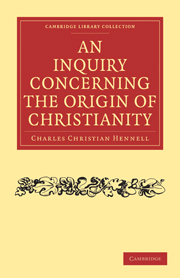Book contents
- Frontmatter
- PREFACE
- Contents
- ERRATA
- CHAPTER I Historical sketch, from the Babylonish captivity to the death of Jesus
- CHAPTER II Historical sketch, continued to the end of the first century
- CHAPTER III On the date and credibility of the Gospel of Matthew
- CHAPTER IV On the date and credibility of the Gospel of Mark
- CHAPTER V On the date and credibility of the Gospel of Luke
- CHAPTER VI On the date and credibility of the Gospel of John
- CHAPTER VII Examination of the accounts of the Resurrection and Ascension
- CHAPTER VIII Remarks on the other miracles in the four Gospels
- CHAPTER IX General objections to the miracles of Jesus
- CHAPTER X Remarks on the miracles in the Acts of the Apostles
- CHAPTER XI On the evidence afforded to the miracles by the apostolic writings
- CHAPTER XII On the prophecies
- CHAPTER XIII On the parts of Isaiah supposed to relate to Christ
- CHAPTER XIV On the book of Daniel
- CHAPTER XV Whether Jesus foretold his own death and resurrection
- CHAPTER XVI On the character, views, and doctrine of Jesus
- CHAPTER XVII Comparison of the precepts of Jesus with the Jewish writings
- CHAPTER XVIII Concluding reflections
- APPENDIX
CHAPTER XVIII - Concluding reflections
Published online by Cambridge University Press: 05 March 2012
- Frontmatter
- PREFACE
- Contents
- ERRATA
- CHAPTER I Historical sketch, from the Babylonish captivity to the death of Jesus
- CHAPTER II Historical sketch, continued to the end of the first century
- CHAPTER III On the date and credibility of the Gospel of Matthew
- CHAPTER IV On the date and credibility of the Gospel of Mark
- CHAPTER V On the date and credibility of the Gospel of Luke
- CHAPTER VI On the date and credibility of the Gospel of John
- CHAPTER VII Examination of the accounts of the Resurrection and Ascension
- CHAPTER VIII Remarks on the other miracles in the four Gospels
- CHAPTER IX General objections to the miracles of Jesus
- CHAPTER X Remarks on the miracles in the Acts of the Apostles
- CHAPTER XI On the evidence afforded to the miracles by the apostolic writings
- CHAPTER XII On the prophecies
- CHAPTER XIII On the parts of Isaiah supposed to relate to Christ
- CHAPTER XIV On the book of Daniel
- CHAPTER XV Whether Jesus foretold his own death and resurrection
- CHAPTER XVI On the character, views, and doctrine of Jesus
- CHAPTER XVII Comparison of the precepts of Jesus with the Jewish writings
- CHAPTER XVIII Concluding reflections
- APPENDIX
Summary
Whatever be the spirit with which the four Gospels be approached, it is impossible to rise from the attentive perusal of them without a strong reverence for Jesus Christ. Even the disposition to cavil and ridicule is forced to retire before the majestic simplicity of the prophet of Nazareth. Unlike Moses or Mahomet, he owes no part of the lustre which surrounds him to his acquisition of temporal power; his is the ascendancy which mankind, in proportion to their mental advancement, are least disposed to resist—that of moral and intellectual greatness. Besides, his cruel fate engages men's affections on his behalf, and gives him an additional hold upon their allegiance. A virtuous reformer and sage, martyred by crafty priests and brutal soldiers, is a spectacle which forces men to gaze in pity and admiration. The precepts from such a source come with an authority which no human laws could give; and Jesus is more powerful on the cross of Calvary than he would have been on the throne of Israel.
The virtue, wisdom, and sufferings of Jesus, then, will secure to him a powerful influence over men so long as they continue to be moral, intellectual, and sympathizing beings. And as the tendency of human improvement is towards the progressive increase of these qualities, it may be presumed that the empire of Christianity, considered simply as the influence of the life, character, and doctrine of Christ over the human mind, will never cease.
- Type
- Chapter
- Information
- An Inquiry Concerning the Origin of Christianity , pp. 357 - 371Publisher: Cambridge University PressPrint publication year: 2010First published in: 1838



